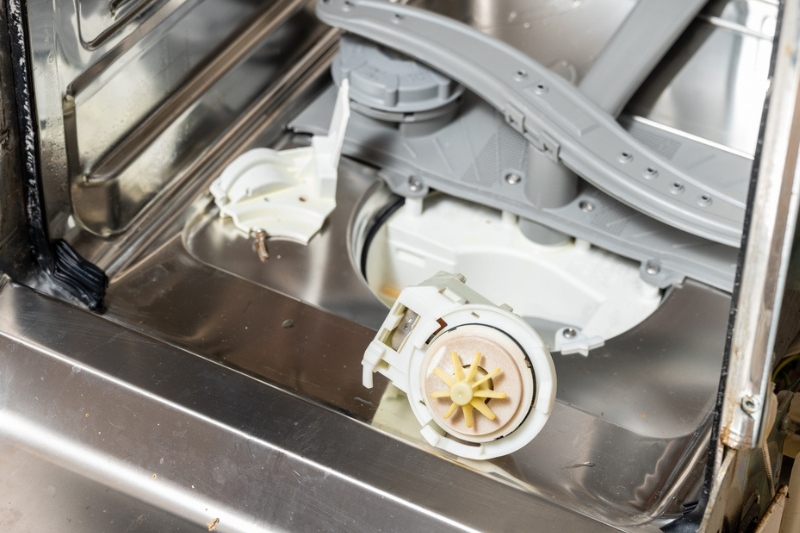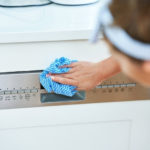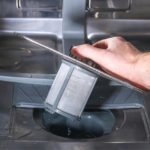Dishwashers are an essential appliance in many homes across the UK. They quickly and effortlessly clean our dirty dishes, saving us the time and energy of washing them by hand.
However, with regular use, your dishwasher will collect food particles and other debris that can cause clogs and reduce the appliance’s performance.
When this occurs, it’s vital that you clean your dishwasher’s filter and pump to remove the build-up and extend the machine’s lifespan.
Most people already know how to clean a dishwasher filter, but the pump is another story.
That’s why we have put together this comprehensive guide on how to clean a dishwasher pump so that your appliance will continue to run smoothly for years to come.
Read on for all you need to know!
How to Clean a Dishwasher Pump
When a large appliance like a dishwasher stops working correctly, it can be tempting to call a professional out to sort the issue.
Although this will help to get your dishwasher up and running again, you can quickly fix many problems yourself. Among these is a blocked dishwasher pump.
If you think your dishwasher pump is clogged, take a few minutes to check for any foreign materials. This could be anything from shards of glass and plastic to large chunks of food.
If you clean your pump and remove this item, your dishwasher will soon start working as usual. This can be done using the below steps.
1. Locate and remove your dishwasher filter
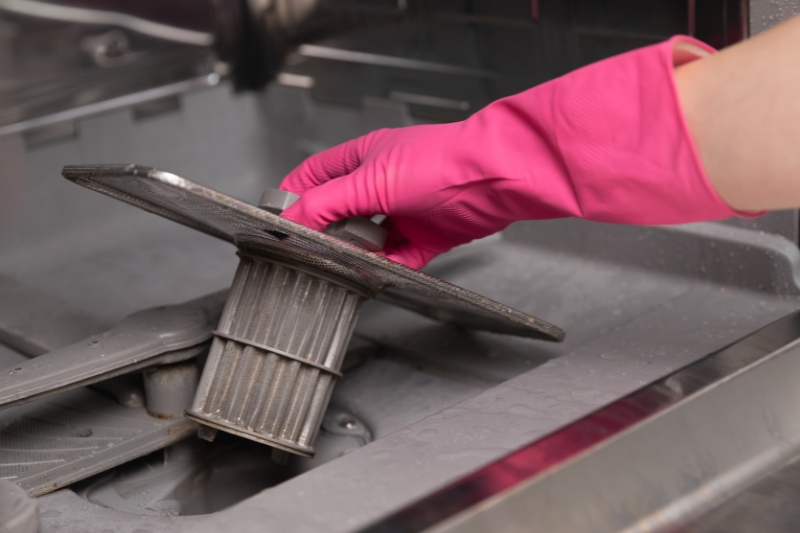
Start by locating the dishwasher pump. This will be found in the base of your dishwasher, where the dishwasher filter is kept.
Depending on the make and model of your appliance, you may have to remove the spray arms to access the area, but for many designs, you can simply move them out of the way to access the pump.
Once located, remove the filter according to your dishwasher’s instruction manual. This will give you direct access to the pump underneath.
If desired, you can clean the filter at this point and remove any accumulated debris that may be impacting your dishwasher’s performance.
2. Clear any large bits of debris from the pump
Put on a pair of protective gloves and use a sponge to soak up any residual water obscuring your view of the dishwasher pump. Then, gently pry the pump cover off to access the inside.
You may be able to do this by hand, but other models will require a screwdriver to remove this. For exact instructions, it’s always best to check your user manual.
When you have a clear view of your dishwasher pump, check for any foreign objects blocking the mechanism. If there are any, carefully remove them with your gloved hand.
3. Use a cleaner to remove any remaining build-up
Aside from foreign objects, the build-up of fats and limescale can affect a dishwasher pump’s performance.
These deposits can be removed using white vinegar (for limescale) or degreaser (for fats and oils). Simply use an old toothbrush to scrub the cleaner over any affected areas.
While doing this, pay close attention to the pump impeller. For your dishwasher to work properly, the impeller must be able to move freely without any obstructions.
If you notice that the component is damaged, it will need to be replaced by a professional.
4. Return the pump cover and filter
Once everything is clean, you can replace the pump cover and filter back into their rightful places.
Double-check that they are both securely in place before closing your dishwasher, as any loose parts could damage the appliance and affect its performance.
What Causes a Dishwasher Pump to Go Bad?
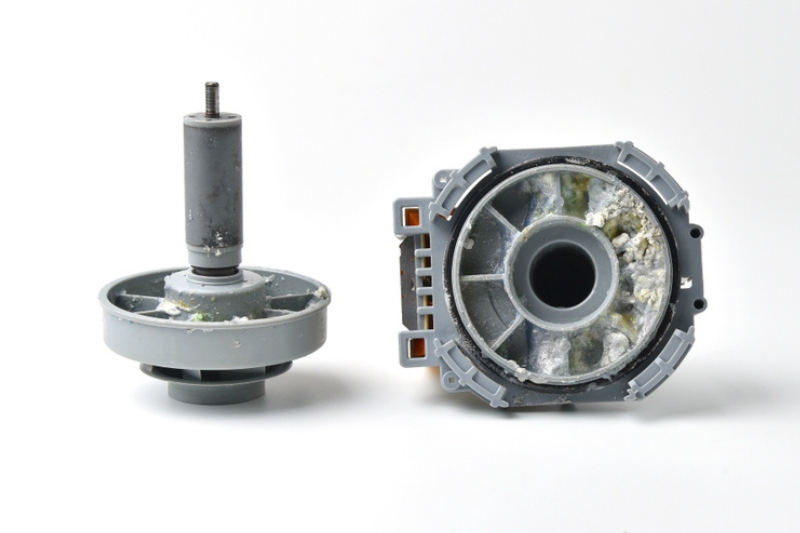
Several things can cause issues with your dishwasher pump, each of which is covered below.
It is important that you are aware of these factors so that you can properly clean and maintain the pump.
- Accumulation of debris: Over time, food particles, soap scum, and other debris accumulate in your dishwasher pump. These are the leading cause of big clogs that significantly reduce the performance of your appliance.
- Limescale: If you live in a hard water area and are prone to limescale build-up, this could also affect your dishwasher pump. As water flows through the machine, mineral deposits will start to coat the pump, preventing it from functioning correctly.
- Grease and grime: The grease and grime that comes from your dirty dishes can build up over time if your dishwasher is not regularly cleaned. This deposit will hinder the pump’s ability to do its job effectively.
- Lack of regular maintenance: A lack of general maintenance will cause your appliance to deteriorate slowly. This is because all the residues mentioned above cause your dishwasher to work harder, therefore wearing out the internal components, including the pump.
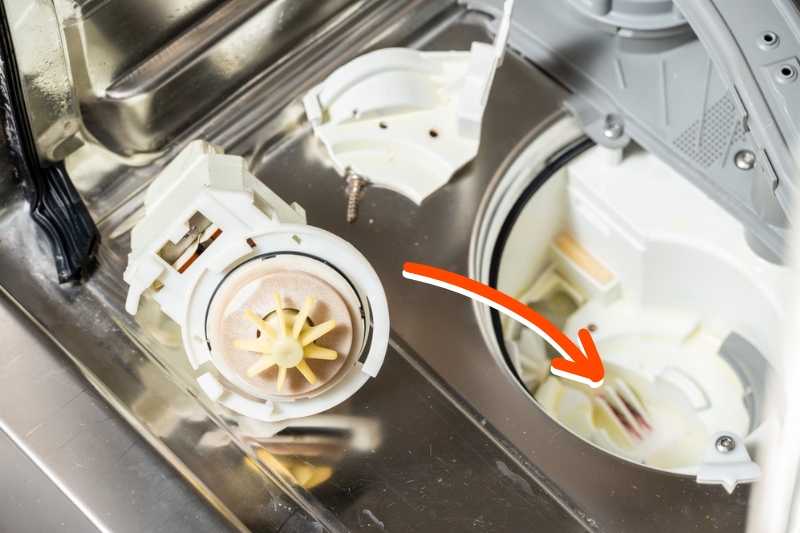
How Do I Know If my Dishwasher Pump Is Clogged?
As a dishwasher pump is completely hidden from view, it can be hard to know when it needs to be cleaned out. Some of the key indicators that your pump is clogged include the following:
- Stagnant water: When a dishwasher pump is clogged, the draining mechanism will not work properly. This can result in dishwasher drainage issues and pools of stagnant water in the bottom of your machine after a wash cycle. It could also cause water to back up into your kitchen sink, as the drainage systems are connected.
- Dirty dishes: A clogged dishwasher pump can impact the spray arm’s ability to rotate and evenly distribute water around the machine when on its cycle. When combined with the increased amount of food particles trapped in the dishwasher, this often results in dishes coming out of the wash dirty.
- Unusual noises: If you hear any unusual noises while your dishwasher is running, that is another clear indicator that the pump may be clogged. This could be the grinding of the pump working against the debris build-up or a loud gurgling sound caused by drainage issues.
- Foul odours: After a while, the food particles and debris trapped in a clogged pump will also start to smell. These foul dishwasher odours will be noticeable whenever you open your dishwasher and may also transfer to your dishes.
If you notice any of these signs, we highly recommend you check your dishwasher pump for clogs. It is also a good idea to regularly clean out the pump, even if you aren’t having issues, as this can help improve your dishwasher’s performance.

Hannah has a passion for cleaning. She worked her way around Australia by cleaning hostels in exchange for free accommodation and used her cleaning skills to bag a job as a chalet host for a luxury ski company in France.
